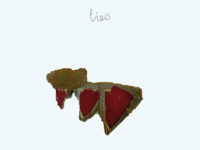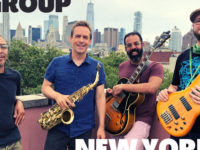Julie Campiche has performed at many festivals and venues; the harpist, composer and educator also collaborates with in many projects and groups. She teaches at Elise Estavoyer Harp School, and leads workshops and master classes. Interestingly, Campiche was the first harpist to get a bachelor’s in jazz at the Haute Ecole de Musique de Lausanne, and the first harpist to study at CNR Department of Jazz in Lyon, France.
On the Julie Campiche Quartet’s Onkalo, Julie is alongside Leo Fumagalli (Lenni Torgue Quintet, Tiss Rodriguez) on saxophone and flute, Manu Hagmann (Florian Favre Trio, Choice, Neology) on double bass and Clemens Kuratle (Moes Anthill, YDivide) on drums.
“Flash Info” opens Onkalo, as Campiche’s harp solos in beautiful, lyrical song with a melody which is reminiscent of Bacharach and David’s “The Look of Love.” The difference is each time the melody settles, there is an interruption from the drums and double bass with the sax joining later. “‘Flash Info’ evokes the media’s incessant flow of news,” Julie Campiche says. “The music just came to my mind after I heard some information on the radio. I felt such a mix of very strong emotions: sadness, anger, melancholy, desperation and stress. So, I tried to translate this in music.”
The regular interruption of the melody really evokes that sense of slight irritation when you think you are settling down to some peace, and then your phone buzzes with a news flash or message. This track is unsettling and atmospheric but also completely nuts. By far the most musical sanity comes in the second half when the band is playing together, pushing up, onwards and using the rhythm as a vehicle over which to experiment. The final section, built over Leo Fumagalli’s rapid, effervescent sax solo, is completely wonderful. But wait, it doesn’t end. Just when the sax almost wails itself into oblivion, it descends again and we are in an eerie, electronic quietude. Down we come. Bliss.
“Cradle Song” is a beautiful, emotive track with harp strings plucked singly at first but gradually the chords build and the rest of the ensemble join in. It is gentle, warm with a reedy, breathy sax solo over the rhythms, which change and weave together. Not sure this would prove a good number to drift off to, as the higher registers of Fumagalli’s sax are brought into play, but it is uplifting – and the final, softer section is gorgeous.
The title track derives its name, Campiche explains, “from the deep geological repository for the final disposal of spent nuclear fuel, the first such repository in the world. I was inspired by the point of view of the Swedish writer Henning Mankell who wrote about this in his last book. He wrote about the fact that this ‘garbage’ will more than likely be the only thing that will be left from our society in 100,000 years – the time for decomposition of this material. So, what does it say about us? Of course, I don’t have any answers, but the question is very inspiring.”
“Onkalo” is more than 12 minutes long, and conjures up images of a forgotten time, a landscape of echoes, strange sounds eerily floating over a constant rumbling basal note and percussive sounds which are as restful as listening to nails on a blackboard. With a single drum salvo, the atmosphere changes and there is danger. We hear odd, quirky rhythms and sounds, along with some explosive electronics, creating the atmosphere of forbidding expectation. Leo Fumagalli’s sax sings over the top in the second section, creating a more melodic, but not tuneful, exploration over Kuratle’s heavy, thudding drums.
In the final section of “Onkalo,” the harp introduces sustained notes, touched with the beauty of vibrating strings only a harp can produce and there is beauty sounding out from the mayhem. This track is an absolute stand out for its inventiveness, the different ways each instrument plays and reacts to the others and the improvised feel to it. The harp flourishes which finish add an essence of purity and flowing hope to the final bars.
“To the Holy Land” was written by drummer Clemens Kuratle, and Julie Campiche rearranged the piece so the ensemble turn it around, starting at the end and finishing at the beginning. Julie says she simply liked the melancholy and strength of the melody. It opens with high harp notes over Manu Hagmann’s deep, plucked bass, the notes resonating and strong. The bass switches to bowed technique, creating another atmosphere, with the notes now echoing form the depth of the wood, each string rasping and yet gorgeous.
Through much of “To the Holy Land,” as drums and sax enter, the simple rhythm is maintained on harp or percussion and the sax sings in lower register across the top, adding melody to the middle section. Just after the seven-minute mark, there is contrast with gentle harp maintaining its rhythm and heavy, highly rhythmic drums, sometimes competing with and sometimes giving way to the harp. The song ends with a militaristic drum section, but it is the harp which prevails, that repeated, one-two rhythm singing gently yet assuredly out, clearly heard all the while.
“Lepidoptera” is, according to Julie, a piece about “the good surprises in life. When you expect something ugly and something beautiful comes.” The track builds with bass and harp creating a sense of peace over fluttering, wing-like sounds provided by the electronics. Over a continual five-note rhythm from the harp, there are a range of gentle sax and percussion additions, all over Hagmann’s bowed bass. Regular hollow knocking then announces a change and Fumagalli’s sax helps to build layers, added to the bass work and fluttering harp before the sax creates a melody literally flying across the top – like a butterfly emerging from the darkness of its chrysalis. There’s a brief pause and then back to the five-note / rest rhythm to the end.
“Dastet Dard Nakoneh” derives its name from the Farsi. This is one of their many words to say thanks. (Literally, it means “Hope you didn’t hurt your hand.”) “I dedicate this piece to all the people and energy that allowed me to be a musician every day of my life,” Julie Campiche says. “As musicians, we are acclaimed on stage, but in order to be able to get there, there are lots of people who support us and stay in the shadows. It includes a very large group of people, from political support for the culture, to very personal help like my mother doing the babysitting during my tour and concerts. So, this is to thank all of them.”
The track ends up being a piece of many parts: from the gentle harp opening to the rolling, emphatic drums and the bass entry, which is gentle and soothing (unlike the drums at this point), and works wonderfully with Julie’s harp and Leo Fumagalli’s sax duet across the top toward the end.
The Julie Campiche Quartet’s Onkalo is a mix of contoured creations. There is variety and a lyricism which is aided immensely by the harp and its range and effects, which can be created by a player with a sense of lyrical narrative and imagination.
At times, there is a sense of drummer Clemens Kuratle doing his own thing, as opposed to the rest of the ensemble – but this also works in many places, creating a sense of change and different tracks being walked, yet alongside. This is one of those albums which improves listen by listen, because then you understand and hear the rhythmic divergences and contrasts which are going on with the drums, bass and harp.
Julie describes her music as an on-going process of musical innovation. She uses her harp and electronic effects, which enhance the scope of her improvisational work. As a harpist, Julie Campiche has an instrument with huge range and depth, and she uses it in her own unique manner and with her own musical interpretation of language.
- Milena Casado – ‘Reflection of Another Self’ (2025) - May 4, 2025
- Luis Ianes and Noel Akchote – ‘Seuil’ (2025) - April 12, 2025
- David Dower Trio – ‘Sonder’ (2025) - March 23, 2025



